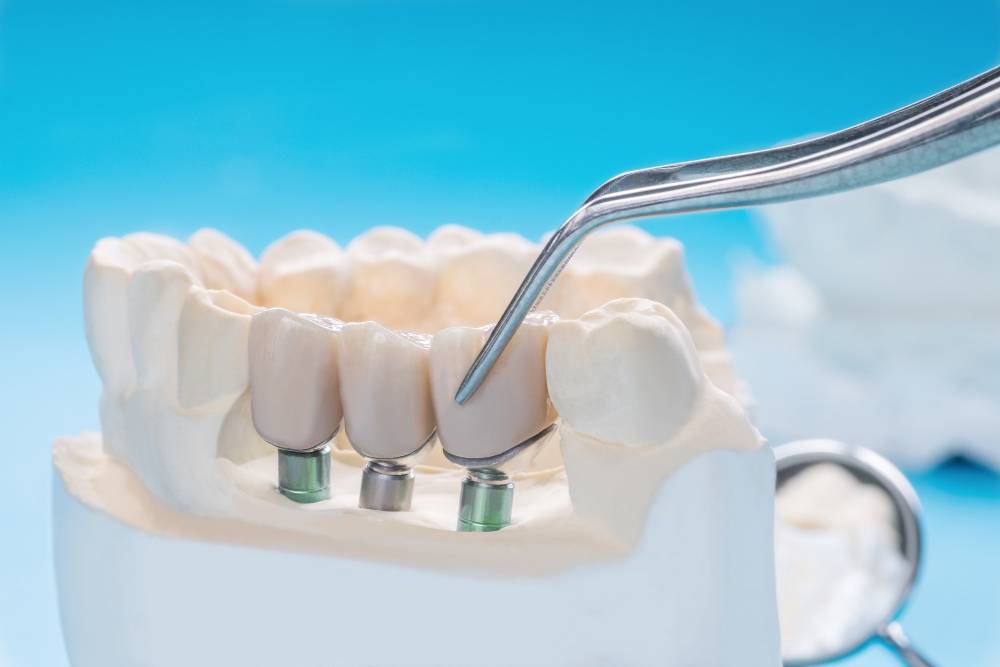Dental implants are a great way to replace missing teeth. If you’re considering getting dental implants, you may wonder how long the entire procedure will take.
This blog post will give you an overview of the implant procedure and explain how long it usually takes. We hope this information helps you make an informed decision about your dental care. Keep reading to know more!
What Are Dental Implants?

Dental implants are a popular dental treatment for people who suffer from tooth loss. The implants are embedded in the jaw bone and act as a replacement tooth. They are usually made from titanium, a biocompatible metal that integrates with the jaw bone over several months.
The dental implant, which acts as an artificial tooth root, is made of several parts:
- An implant is a small metal post embedded in the jaw bone that acts as tooth roots.
- An abutment is a connector piece that attaches to the implant and protrudes from the gum line.
- A dental restoration is an artificial tooth (or teeth) attached to the abutment.
Titanium dental implants are strong and durable and can last many years with proper care. They are also a very natural-looking and attractive option for tooth replacement and can be used to support a temporary crown or a permanent crown, bridges, or dentures.
If you are considering dental implants, talk to your dentist about this excellent treatment to know if it’s right for you.
How Are Dental Implants Done?
Dental implant surgery is one of the most common dental procedures. The surgery is quick and relatively painless, and the results can last for decades with proper care.
Here’s a step-by-step overview of what to expect during the dental implants procedure:
1. Consultation
During your consultation, your dentist will assess your dental health and determine whether dental implants are the right option. They’ll also take X-rays and 3D scans to assess the condition of your jaw bone and gums. Your dentist will develop an implant treatment plan if you’re a good candidate for implants.
2. Surgery
In most cases, dental implant surgery is performed under local anesthesia. The surgery itself is usually quick, taking only one or two hours.
First, your dentist will make an incision in your gums to expose your jawbone. Afterward, the implant will be embedded in your jawbone, and the incision will be stitched.
3. Osseointegration and Recovery Period
After your surgery, your implant will need to undergo a bone fusion process with your jaw bone, known as osseointegration. This can take several months.
You’ll need to follow your dentist’s instructions for caring for your implant during this time. You may need to eat soft foods and take extra care when brushing and flossing around the area during the healing period.
4. Final Restoration/Abutment Placement
Once your dental implants have healed, you’ll return to the dentist to have your final restoration or implant abutment placed. Depending on how many teeth you’re replacing, this may be a dental crown, bridge, or denture.
While the dental implant procedure may take months from start to finish, the implant can last for decades with proper care.
How Long Does a Dental Implant Procedure Take?
Most people are surprised to learn that a dental implant procedure is a quick and straightforward process.
The length of time it takes to complete the procedure will depend on a few factors, such as how many implants are being placed and whether or not the patient needs any additional treatment procedures, such as a bone graft procedure, tooth extraction, or sinus lift.
A successful dental implant requires a few things.
- First, you need to have healthy gums and a healthy jaw bone. If you don’t, your implant might not completely fuse to your jawbone and fail.
- Second, you need to take good care of your implant. Even though tooth implants are not prone to tooth decay, you still need to brush and floss regularly to avoid having gum diseases that could compromise your implant. You should also visit your dentist regularly for checkups and cleanings.
- Third, you need to be prepared for the possibility of complications. Although dental implants are generally safe and effective, there is always a small risk of infection or other issues.
Some people wonder if it’s possible to complete the procedure in a single visit. The entire treatment time, from initial consultation to abutment placement, usually takes around six months. However, some patients may need to wait up to twelve months for their final tooth placement.
Can a Dental Implant Be Done in One Day?

Many people are interested in dental implants but are concerned about whether or not the procedure can be done in one day. While dental implants can be done in one day, it is usually a series of procedures that requires some healing time in between.
For example, the first step of dental implant surgery is to place the implant in the jawbone. This part of the surgery is performed under local anesthesia and takes several hours to complete. Once the implant is in place, the surgeon will close the incision and allow the area to heal.
After the implant has had a chance to fuse with the jawbone, which can take several months, the second phase of surgery can be performed. This involves placing a metal post in the implant, which will attach the dental restoration to the implant. Afterwhich, the fabrication of the crown, bridge, or denture can be started.
While the second surgery can be done in one day, it is important to note that it may take several weeks or months for the dental prosthesis to adjust to the mouth fully. As a result, dental implants are usually not considered a same-day procedure.
For many people, the wait – and the mild pain – are well worth it for the long-term benefits that dental implants can provide.
How Painful Are Dental Implants?
Many people worry about how painful dental implants might be, but the truth is that they are usually no more painful than getting a tooth extracted. Nonetheless, this may not be the same for all since everyone experiences pain differently. You may have more or less discomfort than average.
Recovery time can take several weeks, and during this time, patients often experience swelling, bruising, and pain. Many people report that the pain is manageable with over-the-counter pain medication, but some may require prescription painkillers.
There are a few different reasons why pain may start to become bothersome. This is usually due to complications that, while rare, can be quite painful. Some complications include:
- The implant itself may be placed too close to a nerve, leading to pain or numbness in the nearby tissues.
- The implant site may become infected, which can cause throbbing pain, redness, and swelling.
- The bone around the implant may begin to shrink, causing the implant to become loose and eventually fall out.
- There is inflammation of the tissue around the implant. This is known as peri-implantitis, which can happen if plaque buildup causes the gums to inflame.
Some people may have a higher pain threshold, resulting in them feel feeling less discomfort than others. Those with lower pain threshold may need sedation to maintain comfort.
Do Dentists Put You to Sleep for A Dental Implant Procedure?
One of the questions that patients often ask about dental implants is whether or not they will be put to sleep for the procedure. The answer to this question depends on each patient’s pain tolerance and level of discomfort.
For some patients, local anesthesia may be all that is needed to numb the area around the implant site. However, other patients may prefer to be sedated during the procedure. This decision is typically made between the patient and their dentist or oral surgeon.
Different kinds of anesthesia may be used during a dental implant procedure. These are:
- Local anesthesia:
This numbs the area around the implant site. - Sedation anesthesia:
This relaxes the patient and can be given intravenously (through an IV) or orally (in pill form). - General anesthesia:
This puts the patient to sleep during the procedure.
The type of anesthesia used will affect the duration of treatment. Dental implant procedures that use local anesthesia takes about an hour to an hour and a half. Procedures that use sedation or general anesthesia may take longer, depending on the type of sedation used and how long it takes for the patient to recover.
Final Thoughts
Dental implants are a major investment, both in terms of time and money. The good news is that the dental implant procedure is relatively quick and can typically be completed in two or three visits to the dentist.
However, it’s important to remember that the dental implant process doesn’t end with the surgery. For dental implants to be successful, they need to be cared for properly during the entire healing process, which can take several months.
Once healed, dental implants can provide a lifetime of natural-looking and beautiful smiles. So, while the initial investment may be significant, dental implants are worth the time and effort.
Book an appointment with Comfort Care Dental if you’re considering dental implants. Our team of experts can walk you through the entire procedure and answer any questions you may have.
We want to ensure that you feel comfortable and confident before moving forward with this life-changing treatment. If you’re already in the process of getting dental implants, our team is here to support you every step of the way. Call us at (08) 9349-0800 or book your appointment online.
